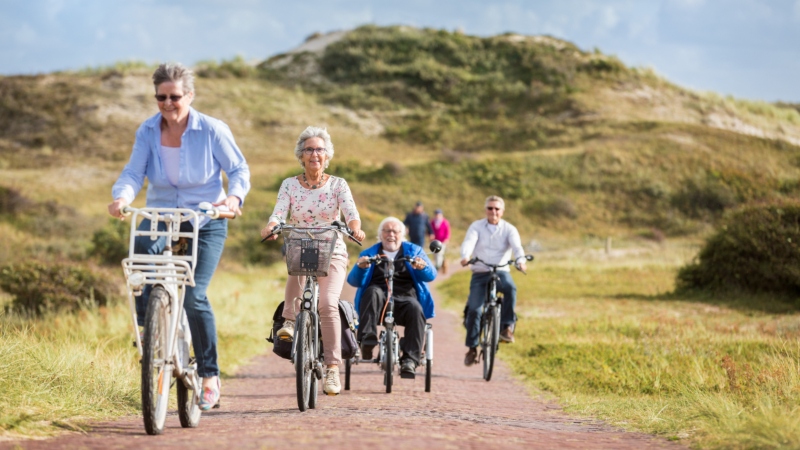
ECF hosts World Bicycle Day Webinar to launch new report with Cities Changing Diabetes
On Friday 2 June, ECF hosted a webinar to celebrate World Bicycle Day and to launch our new report produced in collaboration with Cities Changing Diabetes. The report provides inspiring case studies and examples of community cycling innovations from around the world.
World Bicycle Day
Since a decision by the UN General Assembly in 2018, 3 June has been celebrated as World Bicycle Day each year. The celebration is intended to acknowledge the uniqueness, longevity and versatility of the bicycle as well as its potential as a simple, affordable, reliable and sustainable solution to many contemporary global challenges. This year, on the 2 June, ECF held a webinar to celebrate World Bicycle Day and to launch our new report in partnership with Cities Changing Diabetes (CCD). CCD is a global public-private partnership programme led by Danish pharmaceutical company Novo Nordisk and the Steno Diabetes Centre in Copenhagen which addresses the systemic causes of rising obesity and type 2 obesity levels worldwide, as well as tackling health inequity.
“Cycling for healthier and more inclusive communities”
The report “Cycling for healthier and more inclusive communities” comprises a variety of inspiring case studies which demonstrate the potential of cycling in contributing to more inclusive cities while simultaneously tackling health crises. In the development of this report, we spoke to grassroots organisations, social enterprises and public bodies in Belgium, Brazil, Ethiopia, Germany, Mozambique, the Netherlands, Nigeria, Pakistan and Slovenia. The cases all deal with local and community-focused projects to get people of all ages and backgrounds cycling in an inclusive, healthy and safe way.

CycleOn Project in the Netherlands.
The content of the projects varied from helping children with disabilities to cycle to school in Utrecht, to improving access to bicycles in rural Mozambique, to empowering migrant women through cycling in Freiburg. We hope that this report can serve as an inspiration and a guide for local practitioners who want to improve access to the benefits of cycling in their communities, as well as to policymakers who can fund and support such initiatives. Speaking at the webinar, ECF Policy and Development Director Philip Amaral spoke of the value of such a report in demonstrating the human side of the benefits of cycling, “As this report elegantly shows, the proof is in the pudding: cycling brings joy to people. It forges community bonds. It motivates people to exercise and to explore their surroundings. It enables people to overcome their limitations.”

MolemBIKE project in Brussels, Belgium.
The webinar also featured a panel discussion with representatives from three of the case studies included in the report as well as others working on the cross-cutting topics of active travel, sustainability and health from a range of organisations. The discussion centred around the role of local grassroots and community-centred cycling initiatives in ensuring that the benefits of cycling are brought to those groups that they may otherwise not reach. Lauren Thomas of Mozambikes spoke of her social enterprise's mixed advertising and donations-based model which brings bicycles to rural Mozambican communities: "Imagine that the advertising that you have put into a rural community is also helping people access clinics and hospitals and farming plots and bring clean water to their homes". Maren Ahlers told us about the amazing work of Egre Menged Impact in promoting cycling, particularly among women, in Addis Ababa. Katja Paternoster of PiBiP Kids shared her organisation's experience of promoting cycling among children and Kindergarten pupils in Slovenia: "Our goal is to provide preschool children with a positive cycling experience and by addressing Kindergartens, we definitely reach a larger number of children."
Moving from the on-the-ground experiences to a more policy-focused discussion, Sheila Watson of the FIA Foundation told us that "cycling investment unquestionably delivers greener, safer and more equitable cities and we see it as central to the climate challenge." Echoing this, Fiona Bull of the WHO spoke about the link between cycling's role in sustainability and health: "Increasingly we are seeing and putting cycling and sustainable transport into the climate mitigation policies in addition to urban health and healthy ageing". Jo Jewell of CCD thanked practicioners for their participation in the report and the webinar and told us about plans to make physical activity a stronger focus in CCD's work. On the whole, there was a broad consensus that policymakers need to keep cycling to the forefront of all their work in transportation, ensuring that cycling is integrated into all new infrastructure and that the concerns and needs of end users are adequately considered. Bringing together local practitioners with those working on cycling policy at local, national, EU and global levels created an invaluable opportunity to discuss our holistic and shared vision of a healthier and more sustainable cycling future!

Children's Pedal project in Niterói, Brazil.
This year’s World Bicycle Day was a wonderful opportunity to interact with likeminded cycling-enthusiasts who share our goal of bringing the health and sustainability benefits of cycling to everyone. We were delighted to partner with CCD in the creation of this report and look forward to more fruitful cooperation in future!
Contact the author
Recent news!
Upcoming events
Contact Us
Avenue des Arts, 7-8
Postal address: Rue de la Charité, 22
1210 Brussels, Belgium









